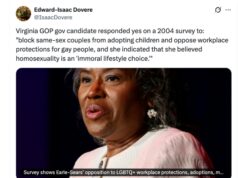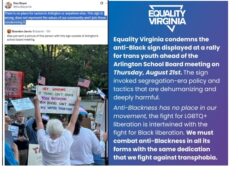by Ronnie Ross
All too often, laws are written in language that is difficult to understand (sometimes, when I’m at my most cynical, I suspect that it is purposeful). Take, for instance, the Conversion Therapy bill that the Virginia Senate just yesterday passed on a party-line vote. That is, 20 Republicans voted to continue to allow “Conversion Therapy” in Virginia while 19 Democrats said “no.” Here is the text of the bill.
The Board of Counseling, the Board of Medicine, the Board of Nursing, the Board of Psychology, and the Board of Social Work may each promulgate regulations prohibiting the use of electroshock therapy or other similar non-speech therapy in the practice of counseling any person under 18 years of age, provided, however, that each such health regulatory board, in promulgating such regulations, shall protect the fundamental rights of the practitioner or patient protected under the United States Constitution and shall not promulgate regulations that remove the fundamental right of an individual to select for himself, based on an informed and voluntary choice, a form of counseling that involves nothing more than “talk therapy,” regardless of the age of the individual, including in situations where the patient is seeking such counseling to assist him in reducing or eliminating unwanted attractions or behaviors or concerns about gender identity.
At first blush, it is nearly incomprehensible. But, let’s drill down and see what it means. First thing to note is that it allows certain boards (Counseling, Medicine, Nursing, and Psychology), if they so choose, to prohibit the use of electroshock therapy (or “similar,” non conversation-based means of therapy) during counseling session, if the person being counseled is under 18 years of age.
This seems great. And it is! We should not be using electroshock therapy on kids! Seems obvious!
However, it is the rest of the bill that is deeply problematic, and perhaps even odious. The bill goes on to “protect the fundamental right” of an individual to choose for him or herself, “regardless of the age of the individual,” therapy “to assist [them] in reducing or eliminating unwanted attractions or behaviors or concerns about gender identity.” Put simply, the bill codifies conversion therapy as a right under the Constitution, irrespective of the age of the person in therapy. The bill does include language that the patient must choose this therapy, but, c’mon, these are children under the age of 18 who we are talking about. To what extent are they even able to consent to conversion therapy?
As difficult as this text is to parse, what is not difficult to understand is the harm that conversion therapy inflicts. Rather than spell it out myself, I’ll let the American Academy of Child and Adolescent Psychiatry talk to you:
“The American Academy of Child and Adolescent Psychiatry finds no evidence to support the application of any ‘therapeutic intervention’ operating under the premise that a specific sexual orientation, gender identity, and/or gender expression is pathological. Furthermore, based on the scientific evidence, the AACAP asserts that such ‘conversion therapies’ (or other interventions imposed with the intent of promoting a particular sexual orientation and/or gender as a preferred outcome) lack scientific credibility and clinical utility. Additionally, there is evidence that such interventions are harmful. As a result, ‘conversion therapies’ should not be part of any behavioral health treatment of children and adolescents.”
AACAP goes on to note that the whole idea of Conversion Therapy is underpinned by the notion that homosexuality and gender diverse identities are pathological. They are not. In fact, they are not included in the Diagnostics and Statistical Manual of Mental Disorders, “or other accepted nosological systems.” Furthermore, while there is no evidence to suggest pathology when it comes to homosexuality or gender identity, there is evidence that Conversion Therapy increases the risk of causing, or exacerbating, mental health issues in the very children who are being treated.
There is a lot more to unpack when it comes to Conversion Therapy, and there are many resources out there. This is simply an introduction. If, like me, you like podcasts, I can suggest UnErased: the History of Conversion Therapy in America. It’s by the folks who do RadioLab.
However, here is what doesn’t need any more unpacking. It would have taken just one Republican Senator to cross party lines and vote down this bill. That includes my opponent, Senator Jill Holtzman Vogel. However, none did. And, as a result, we now have to advocate to be sure it either does not pass the House or that the Governor vetoes it. All because not one of 20 took a stand against Conversion Therapy.
***Update: our immediate pressure worked! According to VAPLAN, Senator Vogel made “the unusual move” to reconsider the vote, sending it back to committee. This move effectively kills the bill. Of course, I can’t help but be deeply cynical about this move. It appears the Senator approved of the bill until public pressure forced her to reconsider it. Nevertheless, this is a wonderful outcome to a shameful story.****














![Monday News: Trump’s Lunacy Pushes China, Russia, India, etc. Together; “Happy Labor Day. Donald Trump and Elon Musk Are Screwing Workers.”; “Where is the [media’s] intense focus on Trump’s failing health?”; ““Trump says he is not a dictator. Isn’t he?”](https://bluevirginia.us/wp-content/uploads/2025/09/montage0901-100x75.jpg)